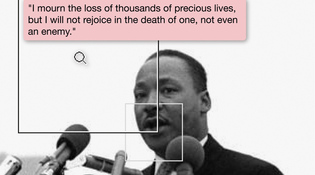 loading
loading
Arts & CultureYou can quote themYale law librarian Fred R. Shapiro is editor of the <i>Yale Book of Quotations</i>.
 Photo illustration: John Paul ChirdonView full image
The death of Osama bin Laden aroused strong emotions in Americans. Many celebrated; others objected to the joyful mood. This more pacifistic response is encapsulated by a supposed Martin Luther King Jr. quotation that spread virally on the Internet:
The last three sentences are accurate, taken from King’s 1963 book of sermons, Strength to Love. The crucial first sentence, however, was never written or uttered by King. It was attached to his words through a process that says much about quotation dissemination and authenticity in the wired age. The protagonist of this story is Jessica Dovey, 24, a graduate of Penn State now teaching English in Kobe, Japan. She has become one of many women whose quotes are widely ascribed to famous men (see “Anonymous Was a Woman,” January/February). It was Dovey who wrote that eloquent first sentence. She put it on her Facebook page and linked to it on Twitter. Immediately after her “I mourn” sentence, she posted the passage on “Returning hate for hate”—in quotation marks and credited to “MLK jr.” Doug Gross of CNN tells what happened next: “Apparently, one of her Facebook friends shared it, and from there, it went viral. Its biggest boost appeared to come from entertainer Penn Jillette, who tweeted the incorrect quote to his 1.6 million followers. He would later correct it. But not before the lightning-fast world of the Internet got wind of the misquote.” Quotation accuracy fiends like myself are used to seeing misinformation accepted as fact. I long ago resigned myself to the reality that pedantic corrections have little chance of competing with compelling distortions of truth on everyone’s lips, or everyone’s screens. But the Dovey tale is a heartening example of Internet mechanisms working speedily and effectively to counter the mistake. Within hours of the passage’s widespread propagation, bloggers and media commentators, such as Megan McArdle on the Atlantic online, questioned the attribution. By the next morning the blogosphere had tracked down Dovey. She told CNN, “I do know where the misattribution occurred, and it was a simple case of an iPhone copy-paste gone wrong.” Quote-garbling also afflicted those who celebrated the death. This quote was everywhere: “I have never killed a man, but I have read many obituaries with great pleasure.” It was attributed to Mark Twain, the great American quotation magnet; any folksy or mildly satiric line tends to be pinned on him. The real progenitor of the second quote was Clarence Darrow. In The Yale Book of Quotations I cited his 1926 congressional testimony: “I have never taken anyone’s life, but I have often read obituary notices with great satisfaction.” But since YBQcame out, I’ve seen the official transcript of the hearing in question, on capital punishment. It records Darrow’s wording thus: “Of course, we are all murderers at heart—that is, I never killed anybody, but I often read an obituary notice with great satisfaction.” I found the transcript in an online search of ProQuest’s congressional database. So again the Internet, spreader of erroneous attributions, redeems itself by supplying the antidote to error—in this case, an authoritative facsimile of the original source.
The comment period has expired.
|
|